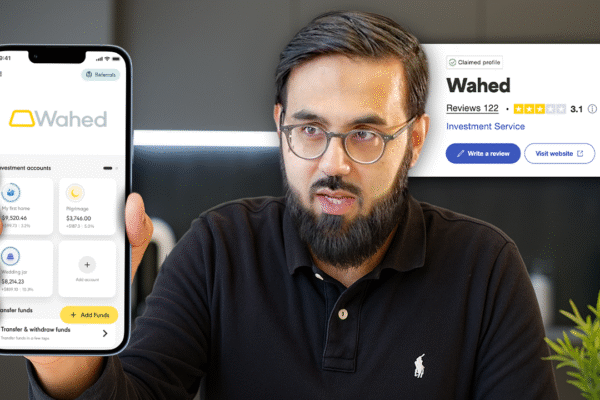
Is the S&P 500 Halal? A Guide for Muslim Investors
26 August 2025 7 min read


Ibrahim Khan
Co-founder
12 min read
Last updated on:
A Self-Invested Personal Pension (“SIPP”) is a great way to save for your retirement. They’re perfect for people who want to be more hands-on with their own investments and want to collate their various pensions together in one place. An Islamic SIPP is simply a SIPP invested in a halal way.
There are now Islamic SIPP providers as well as mainstream SIPP providers who can be used to construct an Islamic SIPP (don’t worry if you’re confused – we’ll explain).
This article gives a brief introduction to SIPPs and their Pros and Cons. Then we dive into a specific analysis of the Islamic SIPP options available and how they compare.
A SIPP is a DIY pension. Many people will have workplace pensions that are offered through a provider like Aviva, Scottish Widows or the like. These workplace pension pots are managed by the fund managers are Aviva etc. and you have limited flexibility over what you can invest in.
With a SIPP on the other hand, you are the boss. You decide what you invest in. But with great investment power comes great investment responsibility, as Spiderman never said. You are now acting as your own fund manager so will have to live with your choices if they go wrong.
But if that doesn’t sound like you – fear not – there are now Islamic SIPP providers who offer ready-made portfolios that you can just opt into. So you get a lot of the benefits of a professionally-structured portfolio that way.
A SIPP is particularly relevant for self-employed individuals who may not otherwise have a pension.
Other key reasons people use SIPPs are:
A low-cost SIPP will be an “execution-only” service usually. This means that the company providing this sort of SIPP will not give you advice or guidance on your investments.
AJ Bell or Hargreaves Lansdowne are two solid options for Muslims to open a SIPP with if you will be doing a DIY SIPP and buying your own funds/stocks. This is because they have a good coverage of Islamic funds.
They are typically the cheaper options to go for as well, as they do not have any management fee charges that you get with a company that manages your money.
A really interesting provider in this category is Pensionbee who have teamed up with us as they provide a sharia-compliant pension plan. Their clever thing is they allow you aggregate all your various pensions from various past employers into one place that you can easily manage. And the entire process is super slick and easy.
However, within this category you also get certain providers (like WahedInvest and SimplyEthical – more on them below) who provide ready-made portfolios (working with their SIPP partners) that you can just put your money into.
This kind of SIPP will usually not let you invest in property directly, offshore funds, or unquoted shares in private companies.
With this kind of SIPP you will be able to invest in a range of assets – including commercial property – and will have access to advisors who can guide you on your investment choices. But of course, you will have to pay a little bit more for this sort of SIPP.
This kind of SIPP is usually only suitable for experienced investors with relatively larger investment pots.
Like most other pensions, you can cash out your SIPP entirely at the age of 55. However, only the first 25% is tax-free. The rest is taxed at your highest tax rate (as in its money on top of your current income). So generally the wiser thing is to take out 25% and then slowly cash out the rest of the SIPP over a number of years to minimise the tax due. Or, alternatively, leave the money in the SIPP and just use the income.
You can also use Buy-to-let mortgages to buy commercial property held through a SIPP. You can check out the Islamic buy-to-let mortgage providers here on our comparison page.
Not all SIPP providers offer a full list of what you can technically hold in a SIPP, but the full list is below:
Any of the above list of assets that is not labelled “haram” should also be sharia-screened for compliance. To learn more about halal stock screening see our course here. For more complex assets you can also post your question to our Muftis on our Fatwa Forum here.
There are four main Islamic SIPP options:
Pensionbee will combine all your previous pensions together into one sharia-compliant pot. You can then contribute to these pensions as you go along thereafter too.
There is an annual fee of 0.95% for their sharia-compliant – and that’s it. No contribution or withdrawal fees etc – which I was simultaneously impressed and surprised by (I did a lot of digging to find a hidden fee).
If you withdraw your pension from Pensionbee within 12 months of joining them there is a £480 fee though. But they seem fairly upfront about that. And I guess if you really really wanted to leave you can just do it after that one year is up.
The pros of this option are the fees and how clear they are. The downsides of this option are that they put all your money into an HSBC fund. So you don’t get exposure to wider asset classes or get the benefit of being able to pick between a range of different risk profiles. You also don’t necessarily get pension advice which you can get the benefit of with Simply Ethical who are financial advisors too.
Wahed launched an in-app SIPP product in 2024 that allows you to invest into their core portfolios (which ranges from very conservative to very aggressive).
Wahed charge their standard fees on that (detailed below) but with an added £2.50 monthly maintenance fee:
If you’re self-employed or a freelancer or you have some old pensions you want to consolidate, and need a halal option, this could be a good way to take control of your pension situation.
Simply Ethical provide their simple SIPP product (i.e. not one you can invest into property or unlisted companies) through Hartley Pensions Limited which is a UK registered company and is authorised by the FCA.
The minimum investment to open an account is £5,000 or £3,000 plus £100 per month. This can be in the form of new pension contributions or transferring existing pension(s).
Simply Ethical offers a platform (like an AJ Bell or Hargreaves Lansdowne) where you can invest in various investment products such as stocks and shares, funds etc. This is their “Trading SIPP Account“.
For the Trading SIPP Account, a minimum investment of £5,000, or £3,000 plus £50 per month, is required. There is no set-up cost but there an annual charge of £108.
The annual fees for this service are as follows:
This charge is subject to a minimum of £12.50 per quarter. Each trades costs £5.95 to execute.
But Simply Ethical can also offer prepackaged portfolios (similar to the Wahed ones) that you can opt for too. This is their “Simplified Advice SIPP“.
They charge a management fee as follows:
Underlying fund fees are additional and estimated to be approximately between 0.48% and 0.73% per annum.
Additionally, there are some other fees:
Wahed charges £200 for setting up the SIPP whereas Simply Ethical’s and Pensionbee’s set-up cost is free. So Simply Ethical and Pensionbee are cheaper here.
The Simply Ethical ongoing admin fee is £108 versus the £30 that Wahed charge. So Wahed is cheaper here. Cheaper still is Pensionbee which doesn’t charge anything. But then their annual fees are higher.
Wahed’s annual fees below £250,000 is 1% and above that is 0.75% whilst Simply Ethical’s annual admin fee is 0.45% for the first £250,000 and 0.25% above that up to £1m, and 0.1% above £1m. So Simply Ethical is cheaper here relative to Wahed. Pensionbee charge 0.95% so are cheaper than Wahed but more expensive than Simply Ethical.
So Pensionbee makes a lot of sense particularly for smaller pensions where the set-up fee and ongoing admin fee will actually form a larger percentage of your pension. As a rough ball-park figure you should do the numbers carefully, accounting for the drawdown fees, ongoing admin fees, and set up fees, particularly where you have a total pot under £50k. Certainly, under £20k, Pensionbee‘s number’s should make it cheaper. But do bear in mind the others pros and cons discussed above.
The things going for Wahed are that (a) I expect their fees to fall as they start to scale; and (b) their user interface and experience is much smoother and simpler than Simply Ethical; and (c) they have gone with their SIPP umbrella company (rather than the Simply Ethical umbrella company) because they will be using them to shortly also launch the UK’s first sharia-compliant diversified workplace pension. But of course Simply Ethical is currently cheaper and does a solid job.
Here’s a table which outlines the key differences side-by-side:
|
|
Simply Ethical |
|||||
|
|
Simplified Advice Online – SIPP Account |
Self Select Trading – Trading SIPP Account |
||||
|
Key features
|
|
Wahed ask you a bunch of questions to ascertain your investment objectives and risk profile and then suggest a suitable portfolio for you. They then manage these portfolios on an ongoing basis including if tweaks need to be made. |
This is simply an online investment advice service which asks you a number of questions to understand your investment objectives and risk profile to then allocate you to a suitable portfolio of investments that are managed by SE on an ongoing basis. |
Self Select Trading service is suitable for those who want to make their own investment decisions. |
||
|
Are my investments managed for me?
|
Yes (these are pre-set portfolios) |
No. This is an execution only service. |
||||
|
Minimum Investment |
£100 |
£5,000 (but this can include a pension you are transferring) |
£5,000 OR £3,000 plus £50 per month |
|||
|
Initial charges
|
|
£0 |
£0 |
£0 (If you fund your SIPP account from an employer deposit or contributions, there will be a £100) |
||
|
Transfer in from defined contribution scheme |
£0 |
£0 |
£0 |
|||
|
Annual charges
|
|
£30 |
£0 |
£108 |
||
|
Annual administration or management charge |
Underlying fund fees are additional and estimated to be approximately between 0.63% and 0.93% per annum.
Underlying fund fees are additional and estimated to be approximately between 0.48% and 0.73% per annum.
This charge is subject to a minimum of £12.50 per quarter. |
|||||
|
Dealing cost |
N/A |
£0 |
£5.95 per trade |
|||
|
Other SIPP charges (Taking benefits) |
|
Taking benefits:
|
|
The online service advises on and manages 6 portfolios:
|
The online service advises on and manages 7 portfolios:
|
Investment options include:
|
|
Service
|
|
Online |
Fully Online |
Part application is online and part paper based |
||
|
Annual calculation of Zakat percentage on your portfolio |
Zakat guidance is provided. |
Yes |
Zakat guidance is provided. |
|||
|
Do I have 24/7 online access to my account? |
Yes |
Yes |
Yes |
|||
|
Can I speak to a person? |
Yes |
Yes |
Yes |
|||
|
Transferring your pension?
|
|
Yes |
Yes |
Yes |
||
|
Transfer in charge |
£0 |
£0 (If you fund your SIPP account from an employer deposit or contributions, there will be a £100)
|
||||
|
To transfer a pension, Are my wet signatures required on transfer form? |
Yes (but moving to an online system) |
No. The transfer process is fully online. |
Yes. |
|||
You can relatively easily transfer your money from a defined contribution pension scheme (this is where the likes of Aviva etc are managing your pension pot and most private employers will have such a pension scheme).
However, really really crucially – if your employer contributed into your defined contribution pension pot, you really shouldn’t go for a SIPP as you would lose that essentially “free” money that the employer is forced to contribute into your pension under UK law.
However if your employer is happy to contribute into your SIPP instead, then that is great and you can go for a SIPP without losing that “free” money.
Defined benefit pensions are usually offered by the government in the public sector (such as the NHS) and are very generous and come with additional perks for spouses. As such you should probably stay in these schemes (and they are also sharia-compliant (see this article we did on this) as long as you can.
You get tax relief up to 100% of your annual salary (up to a maximum of £40,000) when you pay into a SIPP. What that means is that any money you put into a SIPP doesn’t get taxed at the time it goes in. However it will get taxed when it comes out as discussed above.
If you earn over £240,000 however, for every £2 you earn, the allowance reduces by £1 until eventually you’re left with £4000 tax free allowance.
A similar tax-free wrapper is the ISA – where you can put in £20,000 tax-free. This money doesn’t get taxed on the way out though.
Practically, the way a tax relief works is, some of the money that you would have paid in tax on your earning goes instead into your pension pot rather than to the government.
Basic-rate taxpayers get a 20% pension tax relief. Higher-rate payers get 40% and additional tax-rate payers get 45%.
So if you contributed in £10,000 into your pension pot as a basic-rate taxpayer, the government will add £2,500 to that. This is the same for higher-rate and additional-rate taxpayers too, but they can also claim back an additional £2500 (20%) in the case of a high-rate payer and £3,125 (25%) in the case of an additional-rate taxpayer.
So the total “cost” of that £12,500 that ends up in your pension pot is actually cheaper for the higher-rate taxpayer and additional-rate taxpayer. A £12,500 costs them £7,500 and £6,875 respectively.
In other words, for higher earners, the government is incentivising them to put more into their pensions.
An Islamic SIPP is a great option for people who are confident investors, or who want to pool their various investments into one pot, or who might want to invest in commercial property, or self-employed consultants/freelancers who otherwise don’t have a pension.
You can easily set up a DIY SIPP via AJ Bell or Hargreaves Lansdowne, both of whom have a good coverage of Islamic funds.
You can also get started with Pensionbee here. To reiterate, it is relatively inflexible on the options it gives you, but for smaller pension pots is likely the most cost-effective.

26 August 2025 7 min read

24 July 2025 15 min read

16 July 2025 5 min read
Abdurrahman Izhac
6 months ago
I found Interactive Investor is a better option for SIPP compared to HL and others discussed in this article in terms of fees and variety of options to invest including many suitable for Muslims. Is there a reason why they haven’t been considered?